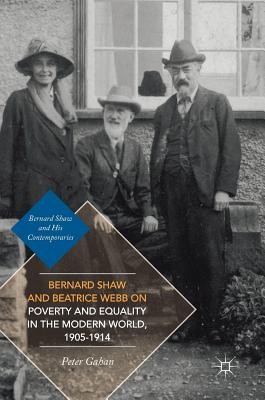
- We will send in 10–14 business days.
- Author: Peter Gahan
- Publisher: Palgrave Macmillan
- Year: 2017
- ISBN-10: 3319484419
- ISBN-13: 9783319484419
- Format: 14.8 x 21 x 1.6 cm, hardcover
- Language: English
- SAVE -10% with code: EXTRA
Bernard Shaw and Beatrice Webb on Poverty and Equality in the Modern World, 1905-1914 (e-book) (used book) | bookbook.eu
Reviews
Description
This book investigates how, alongside Beatrice Webb's ground-breaking pre-World War One anti-poverty campaigns, George Bernard Shaw helped launch the public debate about the relationship between equality, redistribution and democracy in a developed economy.
The ten years following his great 1905 play on poverty Major Barbara present a puzzle to Shaw scholars, who have hitherto failed to appreciate both the centrality of the idea of equality in major plays like Getting Married, Misalliance, and Pygmalion, and to understand that his major political work, 1928's The Intelligent Woman's Guide to Socialism and Capitalism had its roots in this period before the Great War. As both the era's leading dramatist and leader of the Fabian Society, Shaw proposed his radical postulate of equal incomes as a solution to those twin scourges of a modern industrial society: poverty and inequality. Set against the backdrop of Beatrice Webb's famous Minority Report of the Royal Commission on the Poor Law 1905-1909 - a publication which led to grass-roots campaigns against destitution and eventually the Welfare State - this book considers how Shaw worked with Fabian colleagues, Sidney and Beatrice Webb, and H. G. Wells to explore through a series of major lectures, prefaces and plays, the social, economic, political, and even religious implications of human equality as the basis for modern democracy.
EXTRA 10 % discount with code: EXTRA
The promotion ends in 16d.14:04:10
The discount code is valid when purchasing from 10 €. Discounts do not stack.
- Author: Peter Gahan
- Publisher: Palgrave Macmillan
- Year: 2017
- ISBN-10: 3319484419
- ISBN-13: 9783319484419
- Format: 14.8 x 21 x 1.6 cm, hardcover
- Language: English English
This book investigates how, alongside Beatrice Webb's ground-breaking pre-World War One anti-poverty campaigns, George Bernard Shaw helped launch the public debate about the relationship between equality, redistribution and democracy in a developed economy.
The ten years following his great 1905 play on poverty Major Barbara present a puzzle to Shaw scholars, who have hitherto failed to appreciate both the centrality of the idea of equality in major plays like Getting Married, Misalliance, and Pygmalion, and to understand that his major political work, 1928's The Intelligent Woman's Guide to Socialism and Capitalism had its roots in this period before the Great War. As both the era's leading dramatist and leader of the Fabian Society, Shaw proposed his radical postulate of equal incomes as a solution to those twin scourges of a modern industrial society: poverty and inequality. Set against the backdrop of Beatrice Webb's famous Minority Report of the Royal Commission on the Poor Law 1905-1909 - a publication which led to grass-roots campaigns against destitution and eventually the Welfare State - this book considers how Shaw worked with Fabian colleagues, Sidney and Beatrice Webb, and H. G. Wells to explore through a series of major lectures, prefaces and plays, the social, economic, political, and even religious implications of human equality as the basis for modern democracy.


Reviews